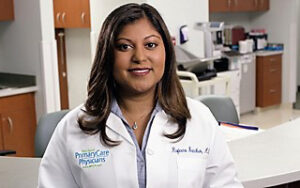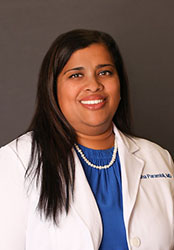Category Archives: Family Health
Staying Safe From Ticks This Summer: What You Need to Know
With summer in full swing, tick activity is ramping up here in the DMV. Whether you’re hiking, gardening, or even just spending more time outdoors, it’s important to protect yourself and your family (including pets) from tick bites and the illnesses they can transmit.
How Can I Prevent Ticks?
The best way to avoid tick-borne diseases is to prevent bites in the first place. If you have pets, talk to your vet about tick prevention for animals. Dogs and cats can carry ticks indoors, even if they’re mostly indoor animals. The CDC recommends following these few strategies for humans:
- Use insect repellant containing ingredients like DEET, picaridin, IR3535, Oil of Lemon Eucalyptus (OLE) on exposed skin and clothing. You can also treat gear or clothing with products containing permethrin, which remains protective even after washing.
- Wear protective clothing: long sleeves, long pants tucked into socks, and light colored clothes to help spot ticks more easily.
- Avoid brush areas with high grass or bushes, and stick to the trails when hiking.
- Check for ticks daily, especially after time outdoors. Focus on hidden spots and crevices like the scalp, behind the ears, underarms, around the waist, and behind the knees. Shower soon after being outdoors.
Are Insect Repellants Safe to Use?
Yes. For most people, insect repellants are safe to use as directed. The CDC and EPA both approve ingredients like DEET, picaridin, and Oil of Lemon Eucalyptus for use on your skin. Always be sure to follow instructions and avoid applying it near eyes, mouth, or open wounds.
What Do I Do If I Find a Tick?
If you find a tick attached to your skin, don’t panic. Follow these steps from the CDC’s tick removal guidelines:
- Use fine tipped tweezers to grab the tick as close to the surface of your skin as possible.
- Pull upward with steady, even pressure. Avoid twisting or jerking the tweezers, as this can cause parts of the tick to break off in your skin.
- Dispose of the live tick by either placing it in a sealed container, flushing it down the toilet, submerging it in alcohol, or wrapping it tightly with tape. Never crush a tick with your fingers.
- Clean the bite area and your hands with soap and water, rubbing alcohol, or hand sanitizer.
Can I Try to Burn Off a Tick?
No. Despite what you may see online, you should never try to burn off a tick using heat or any other method. According to the Mayo Clinic, using matches, lighters, or hot objects can actually increase the risk of infection by causing the tick to release more saliva into your skin. Stick to safe removal with normal tweezers.
When Should You See a Doctor About a Tick Bite?
Most tick bites are harmless, but some ticks do carry diseases like Lyme Disease. According to the National Institute of Health (NIH), you should talk to your MPCP physician if you:
- Develop a rash, especially if it’s bullseye or circular in shape.
- Experience any flu-like symptoms, such as fever, fatigue, headache, or muscle aches within a few weeks of getting bit.
- Aren’t sure how long the tick was attached on your skin.
Be Tick Smart This Summer
By starting a few simple precautions when outside, you can enjoy your summer activities with peace of mind. Know how to prevent tick bites, check for ticks regularly, and act quickly if one is found. And, if you’re ever unsure or start noticing symptoms, make an appointment to speak with your MPCP physician.
Introducing Dr. Margaret Wang
People sometimes ask if I have always wanted to be a doctor. No, but it is certainly one of the top-rated dreams for an Asian immigrant.
Growing up in Beijing in the ‘80s, I rarely visited the pediatrician, and my family usually depended on traditional Chinese medicine. For example, whenever a runny nose and a fever set in, I would be given a sweetened herbal medication called Ban Lan Gen and be forced under a stack of blankets until my pajamas were soaked with sweat, which means that the fever had broken and I would soon recover.
When it comes to medicine, the average Chinese person seems quite torn between their traditional medicine and Western practices. Not many are well-versed in traditional medicine — featuring powerful potions and genuine side effects — but every Chinese person has been steeped in a unique mixture of culture, tradition filled with anecdotes and myths, and a dependence on nature and a distrust for the man-made.
I myself harbor a great interest in acupuncture and toxicology. While I studied at Georgetown University School of Medicine, I took a class on alternative and complementary medicine, which taught me traditional Chinese medicine is not to be trifled with, and that Asian people who are scared of strong Western medications should exercise equal caution over Chinese potions.
Although I share in this cultural understanding about the human body and health, my systematic training in Western medicine remains the pillar of my practice as an internist. This can sometimes be challenging with Asian patients. They often see little value in preventative care and regular checkups, which I appreciate as the basis of sound medical care. Patients can also give pushback about starting a medication, because they believe — and rightly so — that everything with an effect has a side effect.
In the end, it comes down to communicating outside of typical Western medical care — more in the realm of preference, philosophy, and faith. These human discussions provide an important context for medical care and is what makes primary care most interesting for me. Not all doctors share this view, but that is okay. I think it enhances my effectiveness and benefits my patients.
2024 marks my tenth year practicing as an internal medicine doctor. I first spent some time as a hospitalist and at an urgent care center, but I seem to have settled in the right spot at MPCP, for which I am truly thankful. And if you’ve read this article to the end, I wish you a blessed new year.
 Dr. Wang is a Maryland Primary Care Physicians partner and is certified by the American Board of Internal Medicine. She received her medical degree from Georgetown University School of Medicine. She cares for patients in MPCP’s Columbia office.
Dr. Wang is a Maryland Primary Care Physicians partner and is certified by the American Board of Internal Medicine. She received her medical degree from Georgetown University School of Medicine. She cares for patients in MPCP’s Columbia office.
What To Do? Emergency Department vs. Urgent Care vs. Your Doctor’s Office
By: RAFEENA BACCHUS, M.D., MEDICAL DIRECTOR
Having an illness or injury often results in a good deal of anxiety and worry. You want medical attention and relief from your symptoms as quickly as possible. But where should you go to get the best, most appropriate and cost-effective care? The following are the most widely used treatment options and suggestions about when each might be best suited to meet your particular medical needs.
The emergency department
Most emergency departments are part of hospitals, although there are free-standing emergency departments in Bowie and Queenstown. The ED is designed and equipped to handle serious or life-threatening emergencies. It is always open, including nights, weekends and holidays. Patients are seen according to how sick or injured they are. The most serious cases jump to the front of the line, even if they arrive later than everyone else. Physicians in the ED are trained to look for life-threatening conditions, and the tests you will receive in the ED will help them decide if you have any of these.
The emergency department is the right place to go if you have a serious or potentially life-threatening illness or injury: chest pain, sudden weakness on one side of your body, a new seizure, severe headache, persistent heavy bleeding, poisoning, or a large broken bone.
The emergency department is probably not the right place to go if you have a milder illness or a longstanding issue. You are likely to wait longer for treatment. The emergency department doctors do not have access to your medical records. Your visit will be much more expensive — as much as 4-6 times as expensive! Remember, they have to keep all that life-saving equipment available all the time. That’s great if you need it, but it’s just an extra charge if you don’t.
Urgent care centers
There are lots of these in our area. They often have extended hours, including evenings and some weekend hours. They are designed and equipped to handle medical problems that need attention the same day but are not life-threatening. Patients are usually seen in the order they arrive, so your wait will depend on how many other people go to the urgent care center at the same time you do. Many urgent care centers have X-ray and blood testing equipment.
An urgent care center is the right place to go if you have a new illness or injury that occurs when your doctor’s office is closed, such as sprains and strains, painful urination, ear pain, severe cough or wheezing.
An urgent care center is probably not the right place to go if your doctor’s office is open or if you have a serious or life-threatening condition. A visit to an urgent care center is more expensive than a visit for the same condition at your doctor’s office. The provider in the urgent care center does not know you and will not have access to your medical records. Urgent care centers are not equipped with life-saving equipment or providers trained to treat life-threatening illnesses or injuries.
Your doctor’s office
No one knows you like your own doctor. Your doctor is equipped to treat many illnesses and injuries, and can arrange any testing you may need. Your primary care doctor has your medical records and knows your medical history. Patients are seen by appointment. Maryland Primary Care Physician offices reserve appointments for patients who need same-day treatment. Many MPCP offices have evening and/or Saturday hours for your convenience. Call or check our website, www.mpcp.com, for a list of hours at your doctor’s office.
Your doctor’s office is the right place to go if you have a new problem, such as sinus pain, ear pain or flu, cuts or other wounds, sprains or strains, cough, or a flare up of an old problem, such as back pain or migraine headache, or an ongoing problem that may require more testing or treatment, such as persistent stomach problems or joint issues. You will pay the lowest copay at your primary care doctor’s office, and many times you will be able to get an appointment the same day you call. For extra convenience, all MPCP offices offer telemedicine visits after hours, in addition to evening and weekend appointments at some sites.
Your doctor’s office is the wrong place to go if you have a serious or life-threatening condition. If you need care in the next hour, go to the emergency department.
If you’re not sure what to do, call your primary care provider
Even when the office is closed, there is always someone on call who can direct you to the care you need. If you ever need to go to the emergency department or an urgent care center, take a list of all your medications and allergies with you. Let the staff know who your primary care provider is, and schedule a follow up appointment if needed.
 Dr. Bacchus is a MPCP partner and is certified by the American Board of Internal Medicine. She sees patients in the Columbia office and serves as MPCP’s Medical Director.
Dr. Bacchus is a MPCP partner and is certified by the American Board of Internal Medicine. She sees patients in the Columbia office and serves as MPCP’s Medical Director.
Hypothyroidism
By: NISHA ABRAHAM PARAMBIL
The thyroid gland is a small gland, but it plays a significant, complex role in your body. When it does not work properly, it can seriously impact your health.
Located in your neck under your voice box, the thyroid gland controls several things, including your metabolism, body temperature and heart rate.
Hypothyroidism (also known as an underactive thyroid) is a common disorder where the thyroid does not release enough thyroid hormone. This causes your metabolism to slow down. Symptoms of hypothyroidism can include fatigue, weight gain, and cold intolerance. In extreme cases, it can cause life-threatening conditions, such as low body temperature, coma and heart failure.
Hypothyroidism affects people of all ages, but it is especially common among women over 60.
What causes hypothyroidism?
The most common cause of hypothyroidism is an autoimmune condition called Hashimoto’s disease, which causes your body’s immune system to attack and damage your thyroid gland. Other causes include thyroiditis (inflammation of the thyroid), iodine deficiency and thyroid surgery.
How it is diagnosed
Symptoms of hypothyroidism can be similar to other conditions. The main method to diagnose hypothyroidism is with a blood test. If your thyroid is enlarged, your healthcare provider may be able to feel it during an exam. If you have symptoms of hypothyroidism, ask your provider about testing.
If you have hypothyroidism
Hypothyroidism is a life-long condition. It cannot be cured, but it is very treatable. It is typically managed with medication that replaces the hormones your thyroid gland is not making.
Many people with hypothyroidism struggle with gaining weight, so adopting healthy habits is important. Daily exercise can help raise your metabolism, reduce your fatigue and decrease muscle pain.
MPCP’s endocrinology staff specializes in diagnosing and treating glandular conditions like hypothyroidism. You can also learn more with this helpful resource:
Hypothyroidism (Underactive Thyroid) — National Institute of Diabetes and Digestive and Kidney Diseases
 Dr. Parambil is an endocrinologist who diagnoses and treats disorders of the endocrine glands, such as diabetes, pituitary disease, hypothyroidism, hyperthyroidism and osteoporosis. See the MPCP Specialists webpage to learn more.
Dr. Parambil is an endocrinologist who diagnoses and treats disorders of the endocrine glands, such as diabetes, pituitary disease, hypothyroidism, hyperthyroidism and osteoporosis. See the MPCP Specialists webpage to learn more.



